Flash Function Settings
- Flash Firing
- E-TTL Balance
- E-TTL II Flash Metering
- Continuous Flash Control
- Red-Eye Reduction
- Slow Synchro
- Built-in Flash Function Settings
- External Flash Function Settings
- External Flash Custom Function Settings
- Clearing Flash Function Settings/Clearing All Speedlite Custom Functions
Functions of the built-in flash or external EL/EX series Speedlites can be set from menu screens on the camera.
Before setting functions of external Speedlites, attach the Speedlite and turn it on.
For details on external Speedlite functions, refer to the Speedlite's instruction manual.
-
Select [
: Flash control].
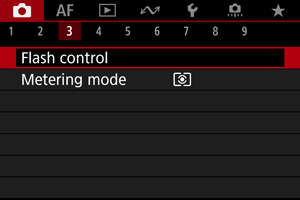
-
Select an option.
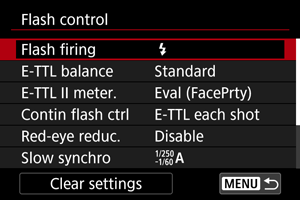
Flash Firing
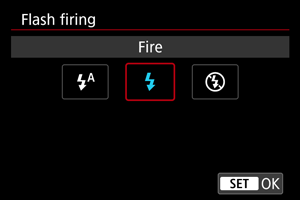
-
Set to [
] (in Basic Zone or P modes) to have the flash fire automatically, based on shooting conditions.
-
Set to [
] to have the flash always fire when you shoot.
-
Select [
] (in Creative Zone modes) to keep the flash off, or if you will use the AF-assist beam.
E-TTL Balance
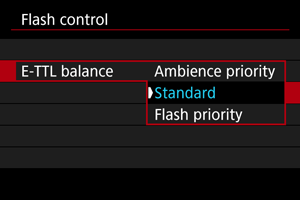
You can set your preferred appearance (balance) for flash shots. This setting enables you to adjust the ratio of ambient light to Speedlite light output.
- Set the balance to [Ambience priority] to lower the proportion of flash output and uses ambient light to produce lifelike shots with a natural mood. Especially useful when shooting dark scenes (indoors, for example). After switching to Av or P mode, consider setting [Slow synchro] in [
: Flash control] to [1/250-30sec. auto] and using slow-sync shooting.
- Set the balance to [Flash priority] to make the flash the main source of light. Useful for reducing shadows on subjects and in the background from ambient light.
Caution
- For some scenes, [Ambience priority] may yield the same results as [Standard].
E-TTL II Flash Metering
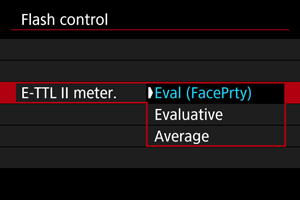
-
Set to [Eval (FacePrty)] for flash metering suitable for shots of people.
- Set to [Evaluative] for flash metering that emphasizes firing in continuous shooting.
- If [Average] is set, the flash exposure will be averaged for the entire metered scene.
Note
- Depending on the scene, flash exposure compensation may be necessary.
Caution
- Even when [Eval (FacePrty)] is set, some subjects and shooting conditions may prevent you from obtaining the expected result.
Continuous Flash Control
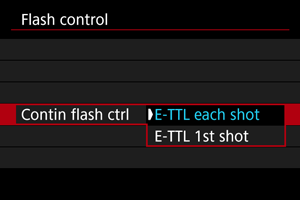
- Set to [E-TTL each shot] to perform flash metering for each shot.
- Set to [E-TTL 1st shot] to perform flash metering for only the first shot before continuous shooting. The flash output level for the first shot is applied to all subsequent shots. Useful when prioritizing continuous shooting speed without recomposing shots.
Caution
- Any subject movement in continuous shooting may cause exposure problems.
- [E-TTL 1st shot] is set automatically in [
] drive mode when external flash units are used.
Red-Eye Reduction
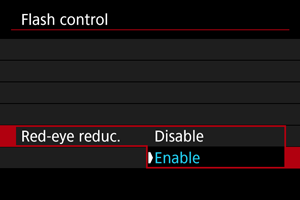
Set to [Enable] to reduce red-eye by firing the red-eye reduction lamp before firing the flash.
Slow Synchro
You can set the flash-sync speed for flash photography in Av or P mode.
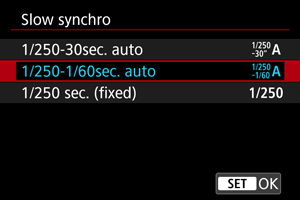
-
1/250-30sec. auto (
)
The flash sync speed is set automatically within a range of 1/250 sec. to 30 sec. to suit the scene's brightness. Slow-sync shooting is used in low-light locations (under some shooting conditions), and shutter speed is automatically lowered.
-
1/250-1/60sec. auto (
)
Prevents a slow shutter speed from being set automatically in low-light conditions. Effective for preventing subject blur and camera shake. Light from the flash provides standard exposure for subjects, but note that backgrounds may be dark.
-
1/250 sec. (fixed) (
)
The shutter speed is fixed at 1/250 sec., which is more effective in preventing subject blur and camera shake than with [1/250-1/60sec. auto]. However, in low light, the subject's background will come out darker than with [1/250-1/60sec. auto].
Caution
- To use slow-sync shooting in P or Av mode, set to [1/250-30sec. auto].
Built-in Flash Function Settings
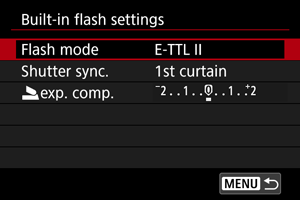
Flash mode
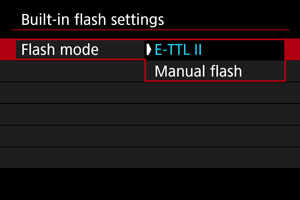
- Set to [E-TTL II] to shoot in E-TTL II/E-TTL fully automatic flash mode.
- Set to [Manual flash] to specify your preferred flash output in [
flash output].
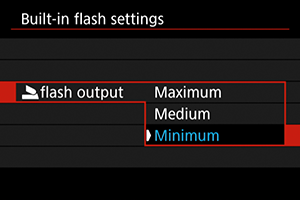
Shutter sync.
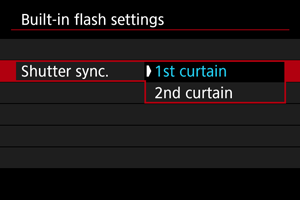
Normally, set to [1st curtain] so that the flash fires immediately after shooting starts.
Set to [2nd curtain] and use low shutter speeds for natural-looking shots of subject motion trails, such as car headlights.
Caution
- When using second-curtain synchronization, set the shutter speed to 1/30 sec. or slower. For shutter speeds exceeding 1/40 sec., first-curtain synchronization is used automatically even if [2nd curtain] is set.
 exp. comp.
exp. comp.
Set the flash exposure compensation if the brightness of the subject does not come out as desired (so you want to adjust the flash output) in flash photography.
-
Select [
exp. comp.].
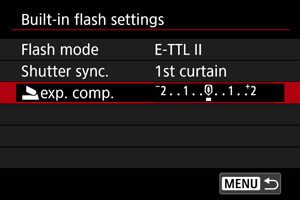
-
Set the compensation amount.
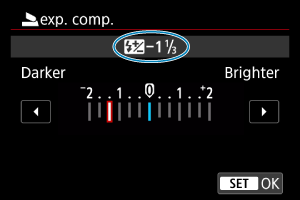
- To brighten flash exposure, set the compensation amount toward [Brighter] (positive compensation), or to darken it, set toward [Darker] (negative compensation).
- After taking the picture, cancel the flash exposure compensation by setting it back to 0.
Caution
- Setting [
: Auto Lighting Optimizer] () to an option other than [Disable] may still cause images to look bright even if you set negative flash exposure compensation for darker exposure.
- If flash exposure compensation is set with a Speedlite (sold separately, ), you cannot set the flash exposure compensation with the camera (Quick Control or external flash function setting). Note that the Speedlite's setting overrides the camera's if both are set at the same time.
Note
- The exposure compensation amount will remain in effect even after you set the power switch to
.
External Flash Function Settings
The information displayed on the screen, position of display, and available options vary depending on the Speedlite model, its Custom Function settings, the flash mode, and other factors. Refer to the instruction manual of your flash unit for details on its functions.
Sample display
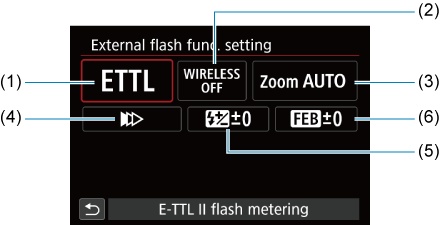
- (1) Flash mode
- (2) Wireless functions/
Firing ratio control (RATIO)
- (3) Flash zoom (flash coverage)
- (4) Shutter synchronization
- (5) Flash exposure compensation
- (6) Flash exposure bracketing
Caution
- Functions are limited when using EX series Speedlites that are not compatible with flash function settings.
Flash mode
You can select the flash mode to suit your desired flash photography.
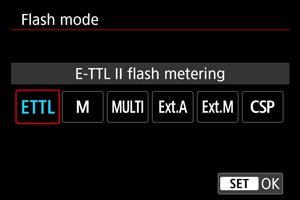
- [E-TTL II flash metering] is the standard mode of EL/EX series Speedlites for automatic flash photography.
- [Manual flash] is for setting the Speedlite's [Flash output level] yourself.
- [CSP] (Continuous shooting priority mode) is available when using a compatible Speedlite. This mode automatically reduces flash output by one stop and increases ISO speed by one stop. Useful in continuous shooting, and helps conserve flash battery power.
- Regarding other flash modes, refer to the Instruction Manual of a Speedlite compatible with the respective flash mode.
Caution
Note
- With [CSP], ISO speed is automatically set to [Auto].
Wireless functions
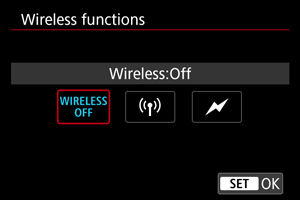
You can use radio or optical wireless transmission to shoot with wireless multiple-flash lighting.
For details on wireless flash, refer to the Instruction Manual of a Speedlite compatible with wireless flash photography.
Firing ratio control (RATIO)
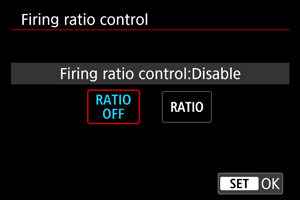
With a macro flash, you can set the firing ratio control.
For details on firing ratio control, refer to the Instruction Manual of the macro flash.
Flash zoom (flash coverage)
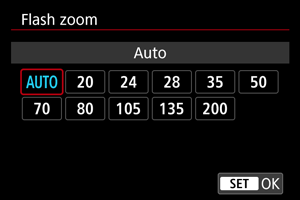
With Speedlites having a zooming flash head, you can set the flash coverage.
Shutter synchronization
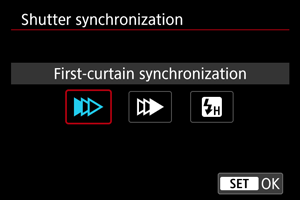
Normally, set this to [First-curtain synchronization] so that the flash fires immediately after the shooting starts.
Set to [Second-curtain synchronization] and use low shutter speeds for natural-looking shots of subject motion trails, such as car headlights.
Set to [High-speed synchronization] for flash photography at higher shutter speeds than the maximum flash sync shutter speed. This is effective when shooting with an open aperture in Av mode to blur the background behind subjects outdoors in daylight, for example.
Caution
- When using second-curtain synchronization, set the shutter speed to 1/30 sec. or slower. If the shutter speed is 1/40 sec. or faster, first-curtain synchronization will be applied automatically even if [Second-curtain synchronization] is set.
Flash exposure compensation
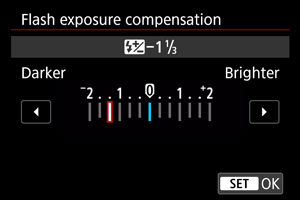
Just as exposure compensation is adjustable, you can also adjust flash output of external Speedlites.
Note
- If flash exposure compensation is set with the Speedlite, you cannot set the flash exposure compensation with the camera. Note that the Speedlite's setting overrides the camera's if both are set at the same time.
Flash exposure bracketing
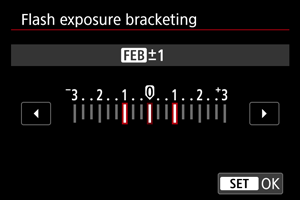
Speedlites equipped with flash exposure bracketing (FEB) can change the external flash output automatically as three shots are taken at once.
External Flash Custom Function Settings
For details on the external Speedlite's Custom Functions, refer to the Speedlite's Instruction Manual.
-
Select [External flash C.Fn setting].
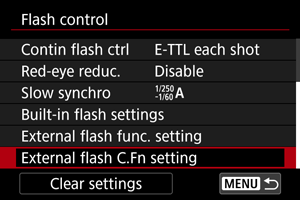
-
Set the desired functions.
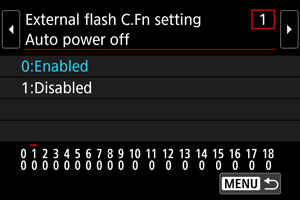
- Select the number.
- Select an option.
Caution
- With an EL/EX series Speedlite, the Speedlite will always fire at full output if the [Flash metering mode] Custom Function is set to [1:TTL] (autoflash).
- Setting or clearing Speedlite Personal Functions (P.Fn) is not possible from the camera's [
: External flash func. setting] screen. Set it directly on the Speedlite.
Clearing Flash Function Settings/C.Fn Settings
-
Select [Clear settings].
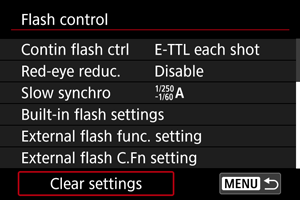
-
Select the settings to be cleared.
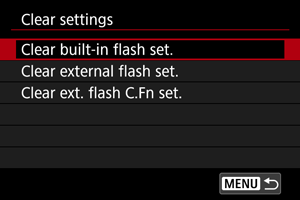
- Select [Clear built-in flash set.], [Clear external flash set.], or [Clear ext. flash C.Fn set.].
- Select [OK] on the confirmation screen to clear all flash settings or Custom Function settings.